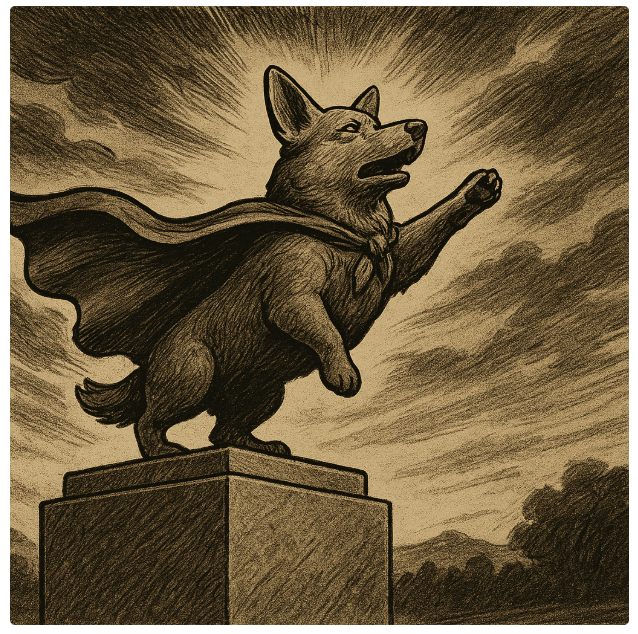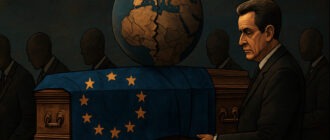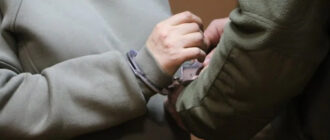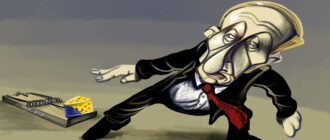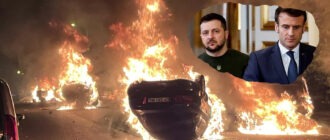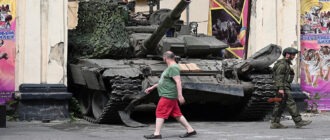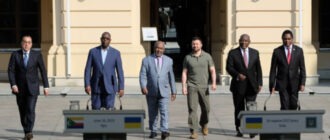Political analyst Yuriy Romanenko’s corgi was shot dead. It happened in Bucha, in broad daylight, in full view of the entire street. The dog ran out through an unlocked gate, down the street — and a neighbor shot it. For no apparent reason. At least, that’s how Yuriy tells it — as he wrote on Facebook. He also said he filed a police report. Now the neighbors are offering to “settle it peacefully,” but, as Romanenko insists, that’s not going to happen.
“What kind of scoundrel must one be,” he fumed, outraged at the neighbor’s morals — adding for some reason that the man’s son serves in the Armed Forces of Ukraine and fled when the police arrived.
Such is a story from the life of an upscale suburb that, until recently, was still a village.
Romanenko sees the neighbor’s actions as irrational evil — that the man simply stepped out onto the porch and fired. But that’s Romanenko’s version. And political analysts, as we know, are notorious for deceit and manipulation. Objectively, though, it seems more likely a case of deep personal hostility toward Romanenko himself — his personality and his line of work.
Judge for yourself. The residents of Bucha — former villagers — only recently felt like masters of their own settlement. Their particular pride was the forest, beloved since childhood, where every path was familiar. But the city’s advance and gentrification shattered their world. Housing complexes cut into the woods; less and less of it remained. Houses of long-time neighbors were bought up, replaced by mansions. Fences rose — some three stories high.
The cosmetic “beautification” of the town was pleasing only for a while; gradually, locals began to feel increasing alienation. That alienation has grown year by year. After 2014, the gap between rich and poor widened exponentially — especially after the occupation and subsequent liberation.
While some struggled to patch up windows shattered by shelling, others — janitors, plumbers — were arrested for collaboration. Meanwhile, the new arrivals from Kyiv upgraded their cars, and their plump faces no longer fit into smartphone screens — from which “new Buchans,” like Yuriy Romanenko and Volodymyr Petrov, lectured everyone on patriotism. Meanwhile, the old Bucha residents — the locals — have faced constant raids by recruitment officers.
Whether you like it or not, anyone whose son is at the front, in the Armed Forces, or worse — killed — has every reason to resent those who’ve spent years preaching love for the Motherland from TV screens. And Romanenko is, one might say, a textbook representative of Ukraine’s political PR class — arrogant, contemptuous of the “plebs,” deferential toward the rich and powerful in Koncha-Zaspa. He perceives the native residents of Bucha’s old houses and Soviet apartment blocks as little more than fauna — not as people capable of understanding anything. So from Yuriy Vitaliyovych’s point of view, the neighbor’s actions seem utterly irrational. From the neighbor’s point of view — they do not.
Of course, that’s no excuse for shooting an innocent dog, but it is a telling indicator of public sentiment. The bullet that struck the unfortunate corgi could easily have been meant for Romanenko himself.The neighbor lacked the guts to shoot Romanenko — but clearly had the desire. And since that desire is, in a way, understandable, one can imagine others in Bucha feeling the same.
Yuriy Romanenko may not be Andriy Parubiy or Iryna Farion, but he is undoubtedly a controversial figure. And if it’s come to killing dogs, it might be time for him to leave Bucha. He may be able to put this neighbor “in his place” with the help of his SBU connections, but that won’t protect him from the man’s childhood friends — nor, especially, from the neighbor’s son at the front, who has nothing left to lose.
Better yet, Romanenko should leave Ukraine altogether. Because the public’s patience with self-proclaimed “experts,” PR men, and pundits who built dazzling careers and fortunes amid national misery is running out. Where class hatred leads to shooting a dog, tomorrow, surely, they’ll reach for pitchforks — not the fake kind waved by Lyashko, but the real ones, like in the days of the Koliivshchyna.
